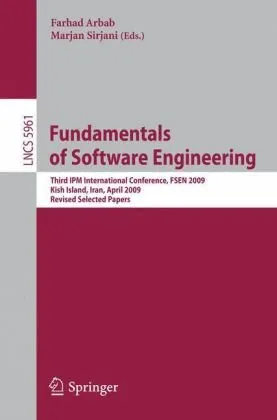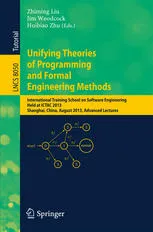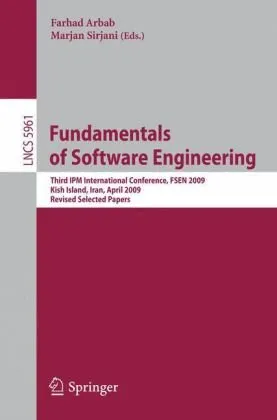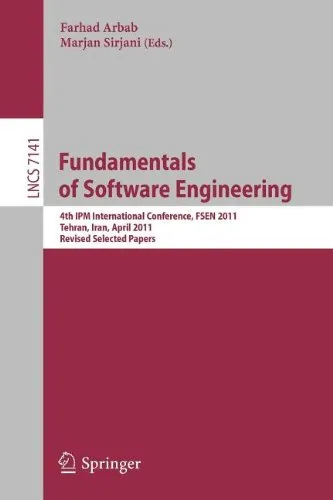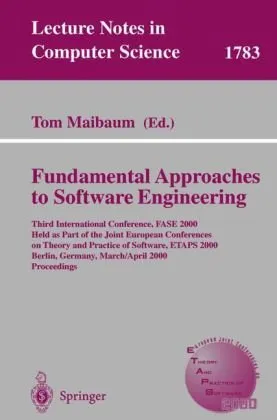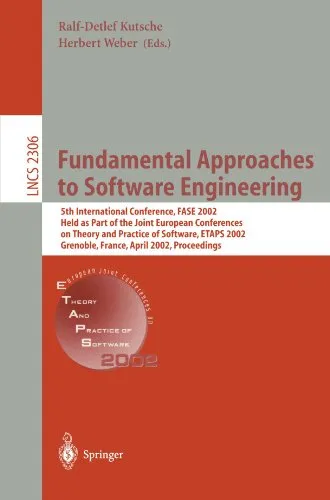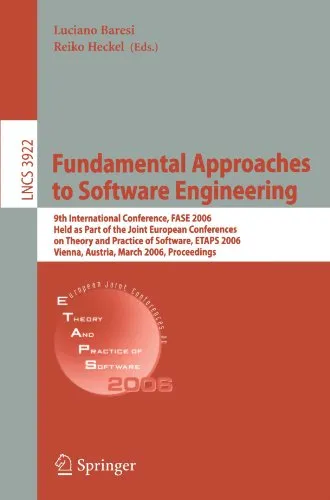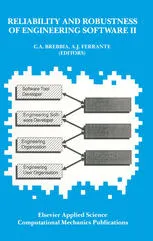Fundamentals of Software Engineering: Third IPM International Conference, FSEN 2009, Kish Island, Iran, April 15-17, 2009, Revised Selected Papers
3.8
Reviews from our users

You Can Ask your questions from this book's AI after Login
Each download or ask from book AI costs 2 points. To earn more free points, please visit the Points Guide Page and complete some valuable actions.Related Refrences:
Introduction to Fundamentals of Software Engineering
Software engineering is the backbone of modern software development processes, ensuring that systems are designed, implemented, and maintained with precision, scalability, and usability in mind. The book "Fundamentals of Software Engineering: Third IPM International Conference, FSEN 2009, Kish Island, Iran, April 15-17, 2009, Revised Selected Papers" is a comprehensive collection of scholarly articles and conference papers that explore foundational topics, ongoing challenges, and future directions in the field of software engineering.
Edited by Farhad Arbab and Marjan Sirjani, this volume captures the diverse perspectives and research contributions presented during the FSEN 2009 conference. The conference brought together academics, researchers, and industry professionals on Kish Island, a picturesque venue for intellectual discourse and collaboration. This book encapsulates the state-of-the-art advancements in software engineering, presenting cutting-edge research, highly technical discussions, and rich conceptual frameworks to build a deeper understanding of this dynamic domain.
With carefully curated revised selected papers, the book covers a wide range of topics, such as formal methods, system specifications, modeling, verification, and programming paradigms. It appeals to both novice readers who seek solid foundational knowledge and seasoned experts looking for innovative methodologies and techniques. Designed to provide a blend of theory and practice, this book is suitable for use as an academic reference, a professional manual, or an introductory text for aspiring software engineers.
Summary of the Book
The book brings together high-quality papers grouped under critical areas of software engineering, such as system modeling, formal verification, concurrency, distributed systems, and programming languages. Each paper is peer-reviewed and reflects rigorous research efforts aimed at advancing the current state of software engineering.
The volume also explores the application of formal methods to ensure the reliability, correctness, and robustness of software systems. Developers and researchers alike are provided with insights into contemporary verification techniques such as model checking and theorem proving. Theoretical advances are coupled with practical applications, highlighting the importance of bridging the gap between theory and practice in building dependable software solutions.
This book emphasizes the increasing complexity of modern-day software systems and proposes solutions for crucial challenges such as compositionality, scalability, and fault tolerance. Readers will also find discussions on emerging trends in concurrent programming, distributed systems, and specification techniques that are more relevant today than ever before.
Key Takeaways
- A deep exploration of formal methods and their role in software verification and modeling.
- Insights into new programming paradigms for reliable concurrent and distributed systems.
- Practical application of theoretical concepts in modern software engineering.
- Methodological frameworks for addressing scalability and compositionality challenges.
- An updated perspective on verification techniques like model checking and their real-world applications.
Famous Quotes from the Book
"Software engineering is not just about solving problems but solving the right problems in the right way."
"The challenge of modern software engineering lies in designing systems that are as simple to reason about as they are complex in functionality."
Why This Book Matters
This book plays a critical role in advancing the understanding of modern software engineering principles and practices. It bridges the gap between academia and industry, providing innovative solutions that can be applied in the real-world context of software design and development. The inclusion of formal methods and system verification ensures that the reader is equipped not only with robust theoretical foundations but also with tools to address practical challenges in software engineering.
Moreover, the contributions in this volume are a testament to the collaborative nature of scientific research. By bringing together experts from different domains, the book fosters a multidisciplinary approach that is essential for tackling the multifaceted challenges of today's software systems. Whether you are a software developer, a researcher, or an academic, this book offers valuable insights, making it a key resource in the field of software engineering.
Free Direct Download
You Can Download this book after Login
Accessing books through legal platforms and public libraries not only supports the rights of authors and publishers but also contributes to the sustainability of reading culture. Before downloading, please take a moment to consider these options.
Find this book on other platforms:
WorldCat helps you find books in libraries worldwide.
See ratings, reviews, and discussions on Goodreads.
Find and buy rare or used books on AbeBooks.
1207
بازدید3.8
امتیاز0
نظر98%
رضایتReviews:
3.8
Based on 0 users review
Questions & Answers
Ask questions about this book or help others by answering
No questions yet. Be the first to ask!
